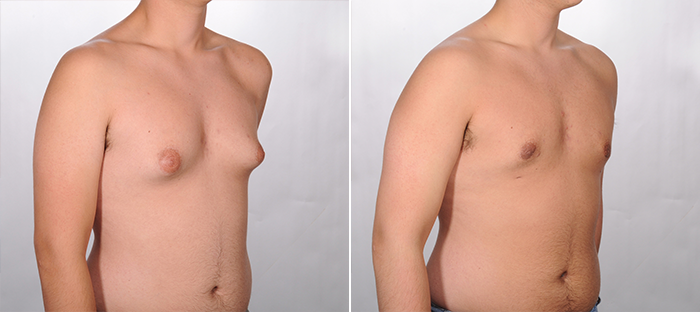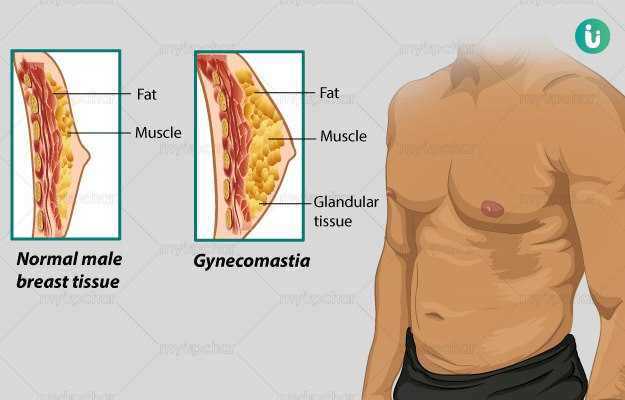The Real Story of Male Breast Enlargement- Gynaecomastia

Let's assume that one fateful morning when you look in the mirror after waking up, you notice something strange: your chest appears larger and there is a faint hint of breast tissue. Apparently, worry, confusion, and even humiliation begin to set in. "Why is this happening to me?" is the question that you won't wait to ask yourself. Well, my friend, you could be suffering from a disease known as gynecomastia. Yes, "man boobs" like it's called informally.
In this article , we will go further into the topic of gynecomastia and provide information on its prevalence, causes, possible side effects, and viable treatments. I promise to bring to light tried all the necessary knowledge you need to know about this condition, whether you're a man dealing with this personally or you just want to learn more about this phenomena.
Let's define what gynecomastia is!

Gynecomastia like some of us will say, is a term used for the appearance of breasts in males due to an expansion of their breast tissue. You know that both sexes have the same appearance of mammary glands in their childhood until puberty sets in, and then things would begins to Change and certain changes becomes visible in their bodies.
As development and growth tends to push from childhood to adulthood, there's a tendency that the gynaecomastia is sure to occur in some certain persons. Contrary to popular belief, this illness is far more prevalent and can affect one or both breasts. Despite what the general public believes, obesity or extra body fat are not associated with gynecomastia. Rather, hormonal imbalances—more specifically, an excess of the female hormone estrogen in comparison to testosterone—are the main cause of it.
Hormonal Imbalance: Hormonal fluctuations throughout puberty may cause transient gynecomastia. The delicate balance between estrogen and testosterone can be upset by major hormonal changes in the body, which can cause the temporary appearance of breast tissue.
Hormonal abnormalities linked to aging may potentially be a factor in the development of gynecomastia in older persons. Oftentimes, this is called "age-related gynecomastia."Drugs and Substance Abuse: - A number of drugs, including antidepressants, anabolic steroids, and anti-androgens, can throw off the hormone balance and result in gynecomastia.
Gynecomastia has also been connected to substance misuse, which includes using heroin, alcohol, and marijuana.Medical Conditions: - A number of illnesses, including tumors, hyperthyroidism, hypogonadism (lower function of the testes), and liver or renal diseases, can interfere with the synthesis of hormones and cause gynecomastia.
The relationship between prevalence and psychological impact is as follows:
Surprisingly, gynecomastia is more frequent than you may think. Up to 70% of teenage boys are thought to have some degree of gynecomastia throughout puberty, which frequently goes away on its own in a matter of months or years. Studies indicate that over 30% of males may be impacted at some time in their lives. The prevalence varies in adults according to age and other factors.
Gynecomastia has a significant psychological impact that should not be disregarded. Many men experience emotions of self-consciousness, humiliation, and even shame when they have larger breasts. It could have a detrimental effect on one's self-esteem, body image, and general quality of life. It's critical for those dealing with gynecomastia to understand that support is available and they are not alone.
Options for Diagnosis and Treatment
It is crucial that you speak with a medical expert who specializes in gynecomastia if you think you may have it. To identify the underlying reason, your doctor will do a comprehensive evaluation that includes a physical examination and may prescribe further testing.
Gynecomastia treatment choices differ according to the condition's severity, length, and effect on the patient's quality of life. If the condition is sometimes brought on by medicine, stopping the prescription or switching to a different one may fix the problem. However, further treatment alternatives can be taken into consideration if gynecomastia continues or causes severe distress:
Medication: - To lessen breast tissue growth and relieve discomfort, doctors may give selective estrogen receptor modulators (SERMs) such tamoxifen or raloxifene.
By blocking the conversion of testosterone into estrogen, aromatase inhibitors can effectively reduce the amount of breast tissue.Surgery: To eliminate the extra breast tissue and restore a more manly chest shape, surgery may be required in situations of severe or persistent gynecomastia. Options for surgery include mastectomy, liposuction, or a combination of the two.
Lifestyle Modifications: - Adopting healthy lifestyle modifications can help prevent gynecomastia associated with lifestyle issues, such as drug misuse or obesity. This might entail giving up dangerous substances, switching to a healthy diet, and working out frequently.
To sum up, many men have gynecomastia, a disorder that can have a profound psychological effect on a person's wellbeing and self-image. It's crucial to keep in mind that getting support and assistance is crucial when managing gynecomastia. You have services at your disposal if you or someone you know is dealing with this illness.
Support Groups: Take into consideration participating in online forums or support groups that are devoted to discussing gynecomastia. These platforms offer a secure environment for people to engage with one another through comparable experiences. It may be very powerful to share your thoughts, worries, and triumphant experiences.
Therapy and Counseling: Managing the psychological effects of gynecomastia requires emotional assistance. You can better manage the emotional difficulties this disease may present by seeking therapy or counseling. A professional can offer direction, coping mechanisms, and a secure environment in which you may communicate your feelings.
Embracing physique Positivity: Keep in mind that no one has a flawless or ideal physique; each person's body is unique. It's critical to promote self-acceptance and body positivity. Pay attention to the attributes, skills, and characteristics that define who you are. Assemble a supportive network and partake in activities that enhance your self-assurance.
Open Communication: Discuss your gynecomastia journey with a spouse, family member, or trusted friend if you feel comfortable doing so. By sharing your story, you may build a strong support network and contribute to greater knowledge and understanding. It may really make a big difference to have loving and welcoming family members.
Citations
- https://my.clevelandclinic.org/health/symptoms/16227-enlarged-male-breast-tissue-gynecomastia
- https://emedicine.medscape.com/article/120858-overview
- https://www.mayoclinic.org/diseases-conditions/gynecomastia/symptoms-causes/syc-20351793
- https://kidshealth.org/en/teens/boybrst.html
- https://www.webmd.com/men/what-is-gynecomastia


Congratulations @jsalvage! You have completed the following achievement on the Hive blockchain And have been rewarded with New badge(s)
Your next target is to reach 75000 upvotes.
You can view your badges on your board and compare yourself to others in the Ranking
If you no longer want to receive notifications, reply to this comment with the word
STOPTo support your work, I also upvoted your post!
Check out our last posts:
Thanks for your contribution to the STEMsocial community. Feel free to join us on discord to get to know the rest of us!
Please consider delegating to the @stemsocial account (85% of the curation rewards are returned).
You may also include @stemsocial as a beneficiary of the rewards of this post to get a stronger support.